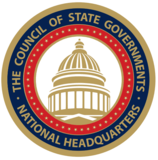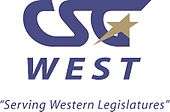Council of State Governments
 | |
| Abbreviation | CSG |
|---|---|
| Motto | Sharing capitol ideas |
| Formation | 1933 |
| Founder | Henry Wolcott Toll |
| Type | non-governmental organization |
| Location | |
Executive Director/CEO | David J. Adkins |
| Website |
www |
The Council of State Governments, or (CSG), is a nonpartisan, non-profit organization in the United States that serves all three branches of state government. Founded in 1933 by Colorado state Sen. Henry W. Toll, CSG is a region-based forum that fosters the exchange of insights and ideas to help state officials shape public policy.[1]
The CSG National Headquarters is located in Lexington, Kentucky, but the council also operates regional offices in Atlanta, Chicago, New York City and Sacramento, California. CSG maintains an office in Washington, D.C. that monitors federal government activities and their impact on state issues and programs.
CSG produces several publications that inform the nation’s public servants on a range of policy issues. CSG publications include Capitol Ideas, a bimonthly magazine, and The Current State, a weekly e-newsletter. The Book of the States, published annually since 1935, provides comprehensive data and analyses about state governments and their operations.[2] The Shared State Legislation, or SSL, program compiles legislation on topics of current importance to states into an annual volume.[3]
As a national organization with a regional focus, The Council of State Governments is committed to providing its members with unique opportunities for personal and professional growth at the regional and national levels. Leadership development opportunities with CSG include the annual Henry Toll Fellowship Program, which brings together some of the nation’s top officials from all three branches of government for an intensive program designed to stimulate personal assessment and growth while providing networking and relationship-building opportunities.[4] Leadership development programs offered in each of the CSG regions—East, Midwest, South and West—are designed to equip talented state policymakers with the skills and strategies to meet the challenges they face in their states and regions.
Other CSG services include policy academies, research briefs, webinars and annual conferences and meetings at the national and regional levels.
The CSG Justice Center, which is based in New York City and has offices across the country, provides practical, nonpartisan advice and consensus-driven strategies—informed by available evidence—to increase public safety and strengthen communities.[5]
CSG national leadership includes a governor, who serves as the national president, and a member of a state legislature, who serves as national chair. CSG regions are chaired by state legislators.
CSG membership includes 56 U.S. states and territories; six Canadian provinces also partner with the council. Annual dues are paid by each state and territory to support the council’s operations. In addition, revenue is derived from publication sales, registration fees, corporate grants and contributions, and investment income.
History [6]
In 1925, Henry Wolcott Toll, then a Colorado state senator, created the American Legislators’ Association, the forerunner to CSG, which provided legislators with information and opportunities to connect. Toll believed interstate cooperation was imperative for states to maintain control over inherent state issues.
CSG—the only national organization that serves all three branches of state government—was created in 1933. “Probably 12 or 15 of us sat around a table in a small room,” Toll recalled 25 years later. “The Council of State Governments had never been heard of before that day.”
About five years after CSG was conceived, a new building at 1313 East 60th St., in Chicago became the council’s central home. In 1967, CSG and the Commonwealth of Kentucky entered into an agreement that provided CSG with a headquarters building in Lexington, Kentucky. The building was dedicated on June 9, 1969. In 1993, the state financed the construction of a second building to facilitate the council’s continued growth.
Some CSG services have been offered since the early years. The Book of the States, which provides comprehensive data and analysis about state governments and their operations, was first published in 1935. State Government News, which later became the CSG bimonthly magazine, Capitol Ideas, was first published in 1958.
The Eastern Regional Conference was established in 1937. CSG opened a Washington, D.C. office in 1938. The Midwestern Legislative Conference was established in 1945. Both the Southern Conference—now the Southern Legislative Conference—and the Western Regional Conference—now CSG West—were established in 1947. In 2006, the CSG Justice Center was formed.
The CSG Henry Toll Fellowship program, a leadership development program for state officials, was established in 1986.
Timeline[6][7]
- 1925 - The American Legislators' Association was established in Denver, CO
- 1930 - The headquarters of the American Legislators' Association moved to Chicago, IL
- 1935 - The Council of State Governments (CSG) was established
- 1937 - The Eastern Regional Conference (ERC) was established as the eastern regional office of CSG
- 1938 - CSG opened a Washington D.C. office
- 1945 - The Midwestern Legislative Conference (now a part of CSG Midwest) is established as the midwestern regional office of CSG
- 1947 - The Southern Conference (now the Southern Legislative Conference) and the Western Regional Conference (now known as CSG West) are established to support CSG's work in the southern and western regions
- 1969 - The CSG headquarters were moved to Lexington, KY
- 1986 - The CSG Henry Toll Fellowship, a leadership development program for state officials was established
- 2006 - The CSG Justice Center was formed out of the ERC justice program
- 2015 - CSG rededicates its national headquarters after a $5.5 million renovation to the original headquarters building [8]
- 2016 - CSG changes address to 1776 Avenue of the States
Regional offices
CSG has 6 offices across the country including 4 regional offices, a federal affairs office in Washington D.C., and the headquarters office in Lexington, KY.[1]
|
Justice Center

On December 3, 2006, The Council of State Governments' Governing Board voted to transform the Eastern Regional Conference’s (CSG/ERC) criminal justice program into a national Justice Center. The Justice Center’s Board of Directors includes state legislative leaders, judges, corrections administrators, juvenile justice agency directors, and law enforcement professionals, who together represent a cross-section of the senior-level state officials who shape criminal justice policy across the country.[5] The Justice Center is headquartered in New York City with additional offices in Austin, Seattle, Bethesda, and Washington, D.C.
Affiliate Organizations
Affiliate organizations contribute specialized expertise, information, resources and issues to the overall mission of CSG. In turn, CSG offers a mechanism by which affiliates may tap into CSG's products and services, and a forum for bringing issues to a broader, collective state audience.
- American Probation and Parole Association
- Association of Air Pollution Control Agencies
- Emergency Management Accreditation Program
- Interstate Commission for Adult Offender Supervision
- Interstate Commission for Juveniles
- Military Interstate Children's Compact Commission (MIC3)
- National Association of State Facilities Administrators
- National Association of State Personnel Executives
- National Association of State Technology Directors
- National Emergency Management Association
- National Hispanic Caucus of State Legislators
- State International Development Organizations (SIDO)
CSG Presidents and Chairs
Notes
References
- 1 2 "CSG Regional Offices". The Council of State Governments. Retrieved 13 May 2016.
- ↑ "Book of the States". CSG Knowledge Center. The Council of State Governments. Retrieved 13 May 2016.
- ↑ "Committee on Shared State Legislation". The Council of State Governments. Retrieved 13 May 2016.
- ↑ "The CSG Henry Toll Fellowship Program". The Council of State Governments. Retrieved 13 May 2016.
- 1 2 "What is the Justice Center?". The Council of State Governments. Retrieved 13 May 2016.
- 1 2 Hopkins, Shawntaye (January–February 2016). "From Milestone to Milestone CSG Evolves From the Vision of Henry Toll" (PDF). Capitol Ideas. Kentucky: The Council of State Governments.
- ↑ The Book of the States. Illinois: The Council of State Governments. 1937. pp. 8–13.
- ↑ "State-funded renovation of national group's Lexington headquarters expected to help with productivity". Lexington Herald-Leader. Retrieved 18 May 2016.
See also
- National Association of Counties
- National Conference of State Legislatures
- National League of Cities
External links
- The Council of State Governments – Official website
- The Council of State Governments events
- CSG East | Eastern Regional Conference
- CSG South | Southern Legislative Conference
- CSG Midwest
- CSG West
- CSG Justice Center
- Capitol Ideas magazine
- The Current State e-newsletter archive
- Shared State Legislation
- Henry Toll Fellowship Program
- Reentry Policy Council
- Charity Navigator: The Council of State Governments
- State of Illinois Wins National Award for Efficiency Efforts (example of interest in States Innovation Awards)
- Pennsylvania Wins Second Innovations Award (example of interest in States Innovation Awards)
- Minister attending Council of State Governments Conference in Burlington, Vermont




